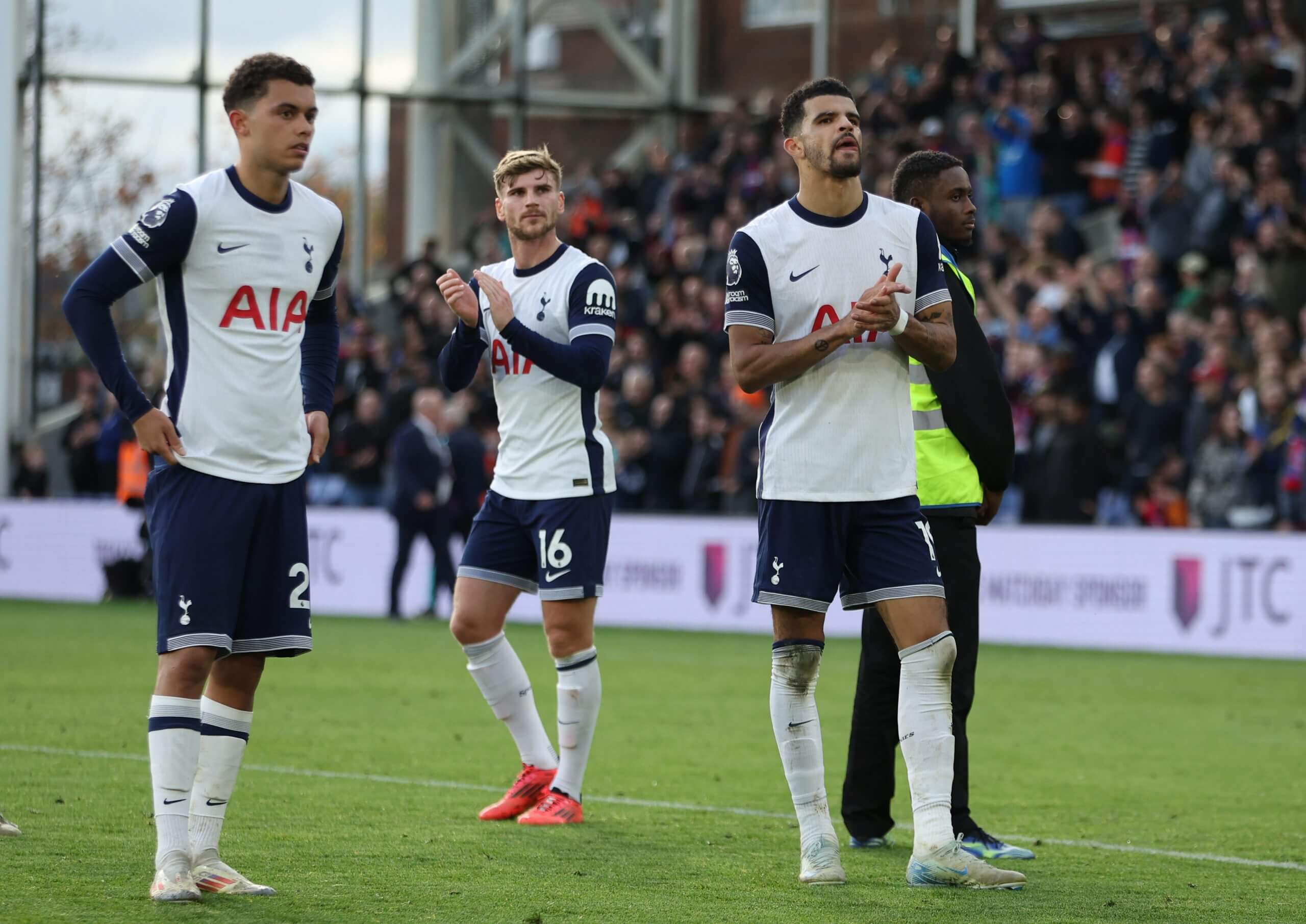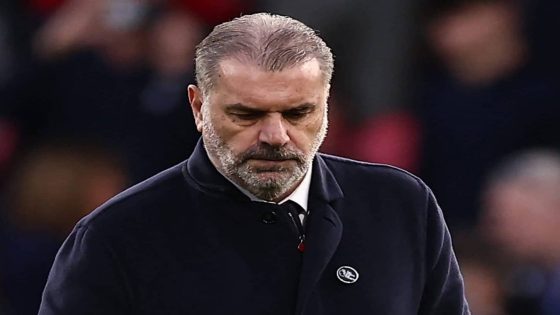When Ange Postecoglou and Guglielmo Vicario were asked to reflect on Tottenham Hotspur’s 1-0 defeat to Crystal Palace on Sunday, the same theme came up in both of their answers.
“It was a game which turned into, and it didn’t surprise me, a bit of a battle,” Postecoglou said in his post-match press conference. “(There was a) lot of stop, starting and standing around. We didn’t deal with that well at all.”
Vicario put it more bluntly: “We play good football, but maybe sometimes we lack the desire to fight,” he told Sky Sports.
This time a year ago, Spurs were at the top of the Premier League table after winning eight of Postecoglou’s first 10 games in charge. Everything he touched turned to gold, but things are a little different now. This team will rip apart Manchester United or West Ham one week but then follow it up with a defeat to Brighton or Palace.
They are difficult to predict, but what is becoming clear is that they struggle against physical teams. It even happened in the first half of their 4-1 victory over West Ham, which Postecoglou described as an “arm-wrestle”. His solution was to replace James Maddison with Pape Matar Sarr at the interval, citing the Senegal international’s running power.
It would perhaps have been more understandable had they experienced these inconsistent performances and results at the start of Postecoglou’s reign, not in his second season. Back then, it could have been attributed to teething problems as they adjusted to his style of play, but now it is an underlying issue that is blocking their progress.
Spurs have lost four out of nine league games this season, which is not good enough for a team with aspirations of finishing in the top four and does not bode well for their dreams of lifting a trophy. Their four wins have all been by at least two goals, and have all been games in which they have led by the early stages of the second half; they do not appear to flourish in tight and tense games.

If Postecoglou is expecting teams to disrupt Tottenham’s game plan in a specific manner, then they have to become better at dealing with that adversity and find different ways to win. It was a topic that previously came up after that 3-2 defeat at Brighton, when he said he did not want to be “falsely rewarded” for not playing well by equalising late in the game against the run of play.
The beauty of sport though is that sometimes the better team loses. Championship-winning teams from across different sports occasionally need to rely on a bit of luck or need to tweak their approach to win. This version of Spurs are guilty of trying to win in the most aesthetically pleasing way possible in every match.
Tottenham concentrated a lot of their attacks down the right wing against Palace, where Pedro Porro, Dejan Kulusevski and Brennan Johnson combined. Oliver Glasner’s starting XI contained three centre-backs and this morphed into a back five out of possession. If Johnson or Kulusevski got in behind left wing-back Tyrick Mitchell, they still needed to find a way past Maxence Lacroix. The huge open spaces exploited brilliantly during the victories over Manchester United and West Ham were not on offer here. Centre-forward Dominic Solanke was an isolated figure in the box as Palace kept the rest of Tottenham’s attack at bay.
Postecoglou did try to switch things up when he made a triple substitution in the 61st minute. Richarlison, Sarr and Timo Werner replaced Kulusevski, Mikey Moore — who struggled to make an impact on his first Premier League start — and Maddison. It meant that Spurs shifted their shape to 4-2-4 with Johnson and Werner staying high alongside Richarlison and Solanke.
This was the first real opportunity to see how Solanke and Richarlison could complement each other (they briefly played together in the final few minutes of added time at the end of the 1-1 draw with Leicester City), but it did not work. Solanke kept dropping deep, turning with the ball and running forward before laying off a pass to his strike partner. Richarlison is still feeling his way up to full fitness after a calf injury and either took a heavy touch or made the wrong run. In future, after they have spent more time understanding each other’s game, being direct with two strikers may be an effective alternative tactic.
Taking off Maddison and Kulusevski left Spurs without a natural playmaker, which did not help. Sarr allowed Yves Bissouma to gain slightly more control, but they did not have anybody with the technical quality to take advantage.
This is still a young team — and one again missing its captain, Son Heung-min, due to a recurring hamstring injury. They were immature at times, which Postecoglou alluded to. “We ended up doing silly things, giving away silly fouls and losing our composure, which just adds to that sort of game when you can’t get any traction,” he said.
“So I think we directed our frustration in the wrong way rather than dealing with it like we should have.”
The best example of this was Kulusevski, who was booked for dissent. The Sweden international has been Spurs’ best player this season since he moved permanently from the right wing into a central attacking midfield role. Yet he was replaced in the second half and, surely, part of Postecoglou’s rationale was that there was a risk he could get sent off.
After an encouraging debut season, the expectation was that Tottenham would keep improving under Postecoglou. There have certainly been some positive signs over the last couple of months, but the last few weeks of mixed results have served as a reminder that progress is not always linear.
(Top photo: Henry Nicholls/AFP via Getty Images)





